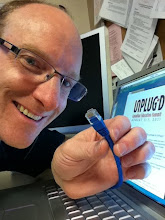Just as it's important to hold students accountable in the appropriate use of previously published materials, educators have a have a moral obligation to the model the ethical use of online content. While 'fair use' policies may give educators permission to use a wide range of materials, this doesn't negate our responsibility to recognize the creators of such works. In failing to acknowledge our sources, we miss out on opportunity to lead by example.
We All Fall Down
 I acknowledge that I have at times used the work of others in inappropriate ways. I've used original pieces of music without permission; I've downloaded YouTube clips in violation of the terms of service; I've grabbed screen captures of images otherwise protected by copyright. But over the past few years I've been really conscious about acting justly with regard to rights of content creators, and have worked to inform others about their obligations with respect to copyright. For the past four years, I've also chosen to freely share my creative work with through the Creative Commons. Others are free to use and remix my photos, writing, presentations, publications so long as they attribute my contribution.
I acknowledge that I have at times used the work of others in inappropriate ways. I've used original pieces of music without permission; I've downloaded YouTube clips in violation of the terms of service; I've grabbed screen captures of images otherwise protected by copyright. But over the past few years I've been really conscious about acting justly with regard to rights of content creators, and have worked to inform others about their obligations with respect to copyright. For the past four years, I've also chosen to freely share my creative work with through the Creative Commons. Others are free to use and remix my photos, writing, presentations, publications so long as they attribute my contribution. What Got Me onto this Topic?
If you've visited this blog in recent years, you'll know that a few of the highlights in my career as a learner have taken place at Educon, a conference of conversations, held annually at the Science Leadership Academy in Philadelphia. As a model learning event for teachers, administrators and librarians, Educon hits the mark in a great number of ways.
Upon visiting the Educon 2.4 website two weeks ago. I couldn't help but grin to see highlighted on the banner, a photo I took at last year's event. It's a group photo from a conversation I hosted with Zoe Branigan-Pipe called "Classrooms of Tomorrow". I clicked on the Creative Commons licensed image expecting it to port to the original shot, but instead, it led to the registration page. Without the intent to do so, the Educon 2.4 website was claiming ownership of my work.
While I await an update to the Educon banner, it leads me to reflect:
How good a job do I do in providing attribution to the work of others?
Do my public websites (blogs, wikis, social media pages) use content without consent?
Can I be more effective in acknowledging the contributions of others in my work?
Am I doing everything I can to model the appropriate and fair use of media?
 Whether hosting a large conference website, or an obscure resource wiki, our public faces to the world must demonstrate appropriate attribution when we choose to use Creative Commons licensed content. At the very least, an incidental lesson will be taught to anyone who takes notice. In the best of circumstances, visitors will be inspired to follow a hyperlink to the creator's work. Uncountable ripples will follow as acknowledged creators will be more and more likely to share future works.
Whether hosting a large conference website, or an obscure resource wiki, our public faces to the world must demonstrate appropriate attribution when we choose to use Creative Commons licensed content. At the very least, an incidental lesson will be taught to anyone who takes notice. In the best of circumstances, visitors will be inspired to follow a hyperlink to the creator's work. Uncountable ripples will follow as acknowledged creators will be more and more likely to share future works.Can You Do Better?
The idea behind attribution is simple: If you use the work of another creator, give the person credit. In doing so, you'll be modelling for learners the appropriate way to recognize the contributions of others. In a world where creating and remixing is open to anyone, it's time to hold ourselves accountable and to model the ethical use of online content.
Photo credit: London Bridge is Falling Down by Forty two. Creative Commons icon by jorgeandresam




